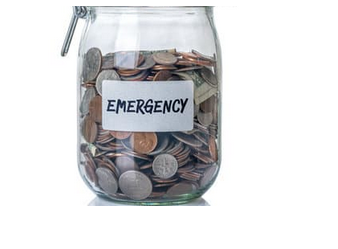Importance of Emergency Fund & Guidelines to Create

You may have a “safe” job or business or other income source. But remember, nothing is permanent in today’s economic conditions. For e.g. a crisis in the company can result in job loss, hyper competition can result in businesses going to losses, etc.
This is one of the reasons why it is very convenient to make an emergency fund. In life, there are a lot of unforeseen events that can affect an individual’s personal finances and if you want to avoid financial hardship when one of the family members loses job or an unforeseen event arises that requires a significant financial outlay, the best thing that can be done is to start creating emergency fund from today itself.
Having an emergency fund can change everything, it can reduce the risk of getting into a large debt in the face of a major unforeseen event. It increases financial flexibility and reduces stress.
When creating an emergency fund, the money destined to this fund must be in liquid state, which at the time of emergency is available without any problem.
The purpose of the emergency fund is not to allocate it to an investment to increase wealth, its only objective is to be fully available in the case of any unforeseen event.
The emergency fund must be very liquid, and may possibly be less profitable. High profitability is not what is pursued with emergency funds. So the idea is to look for the most liquid and secure option with the highest return.
Keeping this in mind, the emergency fund should not be in stocks or investment funds as the value may vary according to the market, as it is not safe) and may also take a few days to convert those stocks into money (it is not 100% liquid) and get it back into your hand.
How much money should form the emergency fund?
Some people will say keeping an amount which is enough to meet the expenses for 3 to 6 months. Others say 6 to 12 months. While others recommend saving a fixed amount.
But the truth is that everyone has a different financial situation and nobody knows better than you, what the individual conditions are. It depends on your current expenses, debt, work or business situation, whether you have a full-time or temporary job, etc.
So basically the emergency fund required is different in each case. And only you should analyze what is the amount to keep in that fund.
Guidelines for creating an emergency fund
The benefits of having an emergency fund is explained above. And below are the guidelines to create it:
Determine the amount of your emergency fund and the date by which you would like it to have it. Analyze your monthly income and expenses to avoid missing deadlines.
Establish a monthly savings amount: You can start with a certain percentage of your income. For example, 10%, and increase this percentage periodically.
Ask your bank to create a savings account and on the 1st of each month to transfer the amount you have decided in the previous point. There are two objectives for doing this:
- To prevent the money going into the current account which cannot be accessed easily.
- Get easy access to the money in the saving account when the need arises
- Automate the savings
Reduce expenses: There is always a little room for improvement when it comes to reducing expenses. You can start by reviewing electricity bills and tariffs, gas and telephone, also review your monthly subscriptions, eliminate the wasted spends, make a shopping list before going to the supermarket, avoid taking the car or drive efficiently, if you have no choice but to use it.
Read this: Unnecessary spends that go unnoticed
Look for some extra income: This does not mean to overtime at work, but try to monetize one of your hobbies or perform some activity in your spare time that provides you with extra money. For example, if you are good at writing and an expert in a field, you can try creating a blog. Private lessons for high school students are also an easy way to earn extra income.
On the other hand, if you receive an extra money e.g. bonus, don’t spend it and put it directly into the emergency fund. The moral boost when this happens is huge. Do the same with extra pay.
Analyze your situation and start creating your emergency fund.
Author Bio:
Hi, I am Nikesh Mehta owner and writer of this site.
 I’m an analytics professional and also love writing on finance and related industry. I’ve done online course in Financial Markets and Investment Strategy from Indian School of Business.
I’m an analytics professional and also love writing on finance and related industry. I’ve done online course in Financial Markets and Investment Strategy from Indian School of Business.
I can be reached at nikeshmehta@allonmoney.com. You may also visit my LinkedIn profile.



